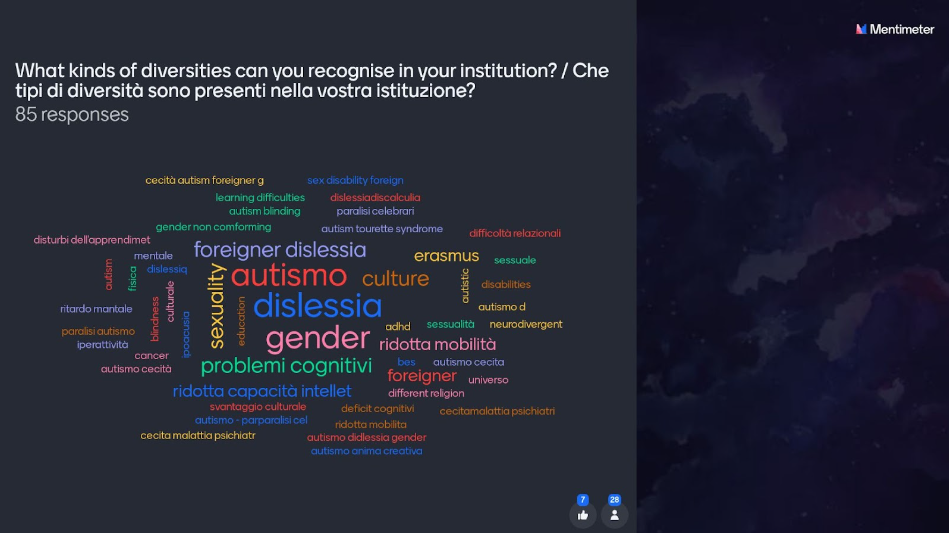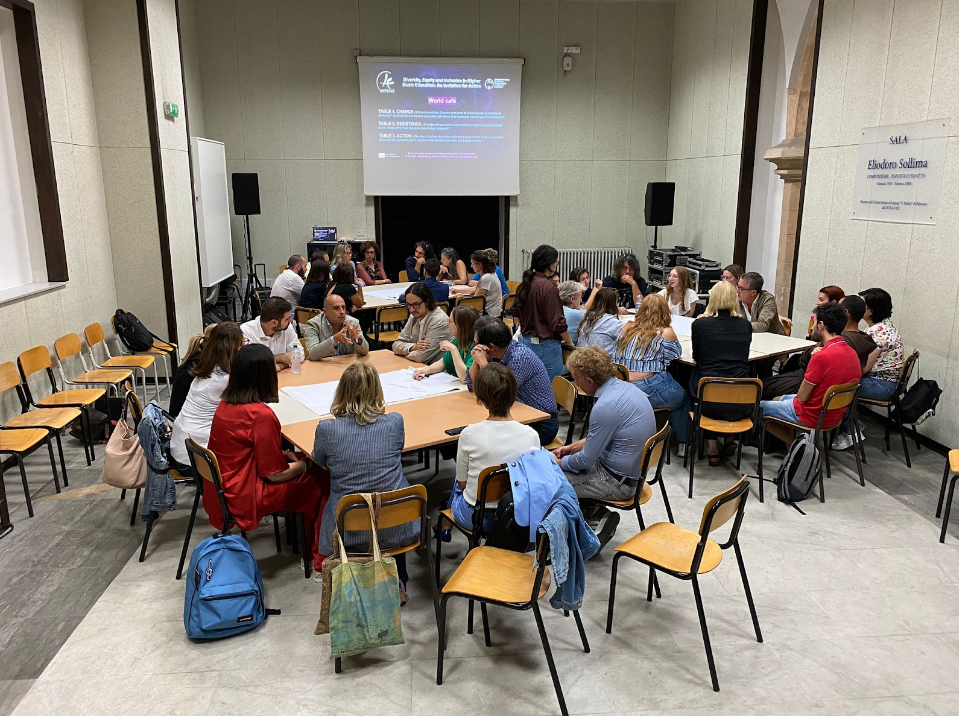Members of the AEC Diversity, Inclusion and Gender Equality (DIGE) Working Group delivered a workshop titled ‘Diversity, Equity and Inclusion in Higher Music Education: An Invitation for Action’, aimed at sharing experiences, identifying good practices, and collaboratively envisioning institutional change in relation to Diversity, Equity and Inclusion (DEI) in Higher Music Education (HME).
The workshop was organised in the frame of the AEC – Empowering Artists as Makers in Society project (ARTEMIS, 2022-2025), co-funded by the European Union. It took place on 2nd October at the Conservatorio di Musica Alessandro Scarlatti in Palermo, and gathered 40 participants, including teachers, students and administrative staff from the following HME institutions in Sicily:
- Conservatorio di Musica Alessandro Scarlatti di Palermo
- Conservatorio di Musica Vincenzo Bellini di Catania
- Conservatorio di Musica Antonio Scontrino di Trapani
- Conservatorio di Musica Arcangelo Corelli di Messina
- Conservatorio di Musica Vincenzo Bellini di Caltanissetta
- Conservatorio di Musica Arturo Toscanini di Ribera
The workshop provided an opportunity for participants to discuss how to build and maintain equitable and inclusive practices, and how such practices can support previously excluded individuals, minority groups and communities. A particular focus was given to the resistance that can emerge when changes are envisioned and implemented in the institutions.
Moreover, the workshop presented a resource package developed by the DIGE Working Group, through which they welcome all AEC members institutions to explore, discuss and implement practices fostering DEI in HME. The publication contains 5 chapters, all of them grounded on the notion of resistance, and can be downloaded here.

The workshop kicked-off with an introduction by all facilitators, followed by a short round of presentations by the participants. Right after, all the participants were encouraged to pair up with somebody they did not know from before, in order to discuss a set of questions. Moreover, participants were encouraged to use Mentimeter to answer the following question: What kinds of diversities can you recognise in your institution?
Later on, participants were allocated to three different tables distributed in a world café setting, with the objective to discuss in depth different topics, facilitated by 1-2 members of the Working Group. The world café ended with a short round by the facilitators sharing the key elements discussed in each of the tables. Formal discussions were generated drawing from the questions below:
- Change: How has your working/study environment changed in terms of diversity? What seem to be the most pertinent issues at the moment with teachers and students?
- Resistance: What kind of resistance have you noticed in response to diversity? How is it dealt with amongst staff and students?
- Action: What sort of action with DEI issues should take place in your institution? Who should it involve, who is responsible?

The workshop ended with a free discussion for reflection and calling for action: What kind of concrete action for change can you take when you get back to your conservatoire? Participants were encouraged to not only consider the question at an institutional level but also in their own everyday work.
Back in June, the AEC opened a call for Active and Associate members from all over Europe and beyond to host these workshops at their home institutions in the upcoming years. Three workshops will be organised at the following time periods: Spring 2024, Autumn 2024 and Spring 2025. For hosting the workshop, AEC member institutions were encouraged to motivate their application by indicating their needs in relation to DEI issues.
Selected institutions will be announced at the AEC Annual Congress and General Assembly 2023 in The Hague, in a parallel session hosted by the members of the DIGE Working Group taking place on Friday, 10th November. For further information, please contact Alfonso Guerra, DIGE Working Group Coordinator at alfonsoguerra@aec-music.eu.






